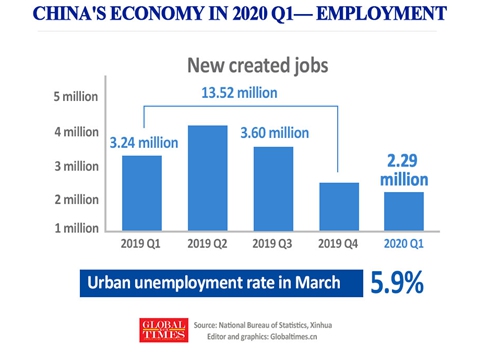China’s unemployment rate eases in March at 5.9%, still under pressure
By Zhang Dan Source:Global Times Published: 2020/4/17 10:17:57

GT
In March, as work resumption increased, China's urban unemployment rate hit 5.9 percent, improving from the all-time high of 6.2 percent in February, official data revealed on Friday. The high number still highlighted the widespread repercussions of the coronavirus pandemic, which has created challenges for the economy and job market while remaining a top priority for policymakers.
In the first quarter, 2.29 million jobs were created in China, the National Bureau of Statistics (NBS) said, adding that 122.51 million migrant workers had resumed work as of the end of February.
Although China's GDP shrank 6.8 percent in the first three months of the year, the first contraction since 1992 when the nation started publishing quarterly GDP data, NBS spokesperson Mao Shengyong said there had been no massive lay-offs.
But the job market is facing downward pressure as companies receive fewer orders, Mao said.
With 84 percent small and medium-sized companies resuming operations as of Wednesday, more Chinese returned to work. But some cannot or are unable to do so, especially those who work in the manufacturing, export-oriented, and service sectors, which have been hit the hardest since the beginning of the pandemic.
Mao noted that migrant workers and new college graduates are particularly affected by the economic impact of the coronavirus.
However, China is not alone in its struggle with a growing unemployment rate.
"As the pandemic has wreaked havoc on Western countries, the jobless rates in the US and Europe grew faster than China's, with predictions hitting above 10 percent in the Western world," Li Chang'an, a professor at the University of International Business and Economics in Beijing, told the Global Times.
European companies have laid off employees at a rate not seen since the 2009 global financial crisis.
Last week, 5.2 million Americans filed for unemployment, bringing the number of claims in a single month to 22 million, according to the US Department of Labor. US business magazine Fortune said the unemployment rate would likely approach 18 percent.
Compared to Western countries, analysts said China could withstand the pressure of domestic unemployment due to the money-saving habits of Chinese, and the country's thriving online economy.
For instance, the virus has increased the pace of delivery services in cities across the country as so many people ordered food online.
"It is obvious that the number of deliverymen in Beijing has grown in recent months, as this is the type of job which everybody can do. As a result, many people choose it after they lose their jobs when returning to the city," a deliveryman surnamed Zhao told the Global Times.
Zhao moved his fingers over the screen of his smartphone to receive an order as "the competition has become harsh now."
From January 20 to April 9, Meituan Dianping, a Chinese platform, recruited 582,000 employees to join its food delivery network, according to company data.
"Companies in express delivery, video games, and online recreation witnessed more active vitality over the past months and posed higher labor demand," Li noted.
What analysts and authorities are concerned with the most is that job hunting has reached an all-time high with 8.74 million college graduates. COVID-19 will likely intensify the competitive job market, even though China's Ministry of Education and relevant departments have organized online recruitment activities for graduates nationwide.
Zhang Jing, 22, is waiting anxiously for a job offer. Currently a senior student majoring in advertising at Xiamen University in East China's Fujian Province, Zhang has had to look for an internship instead of a full-time job.
"If I cannot secure a job offer by the end of April, I would rather take an internship at one of the leading internet companies or video game companies to get working experience," Zhang told the Global Times.
Continuing studies is also an option for Zhang, as China plans to expand enrollment in master's programs, allowing 189,000 more students to enroll in postgraduate programs compared to last year.
Posted in: ECONOMY,BIZ FOCUS